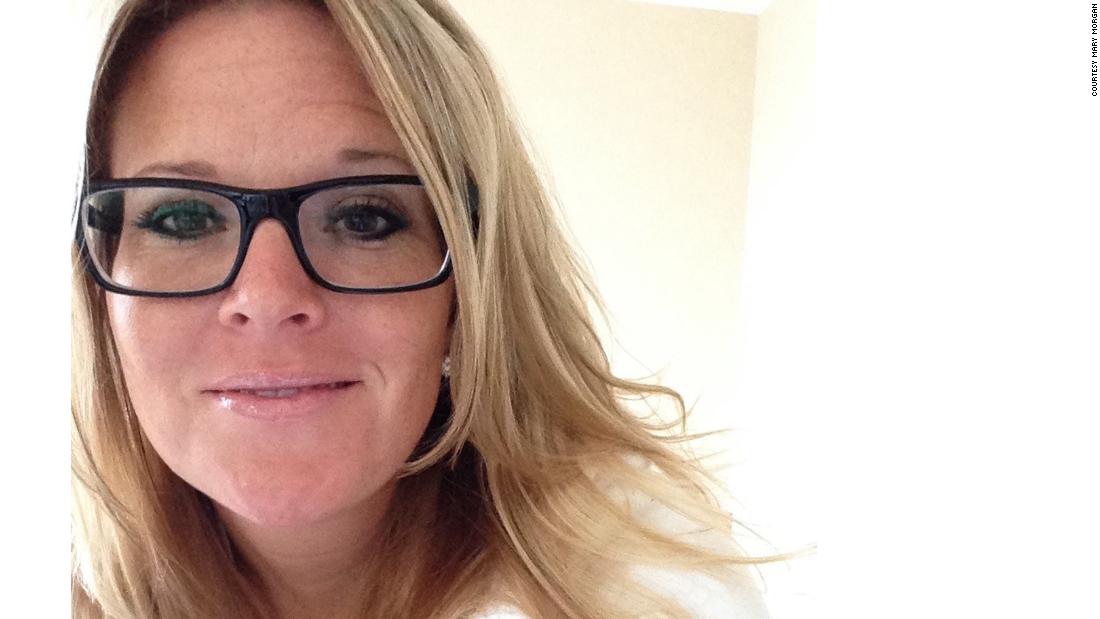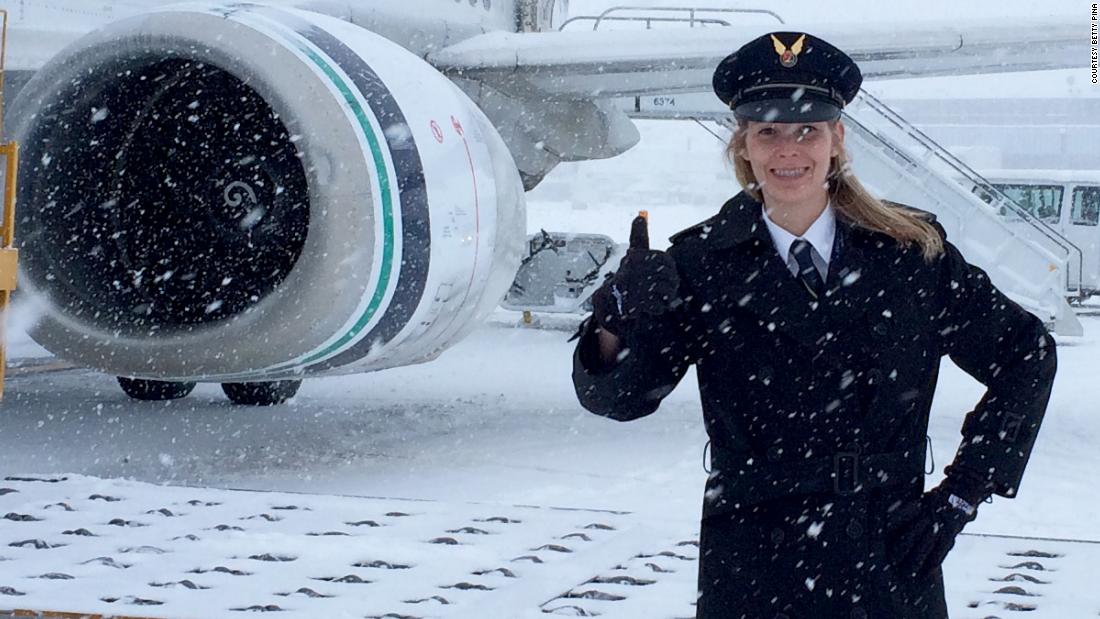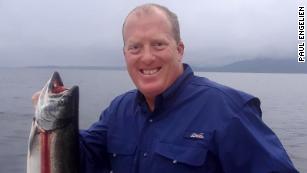She says a pilot raped her, and now she's afraid of running into him at an airport
(CNN)Every time Mary Morgan enters an airport, she's on the defensive, trying to avoid the man she says raped her.
She's been a flight attendant for SkyWest Airlines for 14 years; he is a pilot for the airline, and someone she used to call a friend. She loves her job, she said, but for the past year and a half since the alleged incident, she's been filled with constant dread.
She has diligently dodged seeing him, she said -- though she's had a few close calls. At Seattle-Tacoma International Airport, her home base, she rushes to the flight board to make sure he isn't assigned near her. She knows the types of trips he bids and she avoids flights that use the type of aircraft he flies. If he is assigned nearby, she tries to hide in the airport and avoid common areas, such as crew lounges, until she thinks he's gone.
"It's exhausting, it's time consuming and it's just demoralizing at the same time because you think 'I have to do all of this and my company is doing nothing to help me,'" the 39-year-old told CNN.
Morgan said her case is indicative of a larger problem in the commercial travel industry, one in which sexual harassment from passengers and co-workers is treated as an occupational hazard. She is suing SkyWest, alleging the company is liable for the actions of Capt. Robert L. Rowe, the pilot who she says raped her during a November 2016 stopover.
Rowe did not respond to repeated requests for comment and CNN was unable to identify legal representation for him. Morgan filed a police report, but prosecutors dropped the case, citing insufficient evidence.
"This is an industrywide issue," Morgan said. "It's not just pilots that are rude to flight attendants, it's passengers as well that we deal with constantly, that are making inappropriate comments to flight attendants or touching us inappropriately.
"You just kind of accept it because it comes with the job, but that's still not an appropriate thing."

Mary Morgan in October 2016, one month before she says she was raped by a pilot.
SkyWest declined to comment on Morgan's allegations or provide CNN with a copy of its sexual harassment policy, citing a policy against discussing personnel matters or pending litigation.
"The safety of all SkyWest employees is our first priority. We hold all employees to the highest standards of conduct and have a zero-tolerance policy for assault or harassment in the workplace," the airline said in a statement to CNN. "We take all allegations very seriously."
Morgan said she is suing because she wants to end the cycle of mistreatment of women working in the airline industry -- and she's not alone. Morgan's lawsuit, filed April 25, came one month after Alaska Airlines First Officer Betty Pina sued the airline over how it responded to her June 2017 report of sexual assault by a male colleague during a stopover.
The women are represented by the same Seattle-based law firm, and their claims are similar: On a layover, after drinks with colleagues, they believe their superiors drugged and raped them. Both lawsuits allege that, given the accused pilots' positions of authority on the flight and within the company, the airlines are liable for their actions.
The lawsuits make the airline industry the latest to get swept up in the #MeToo movement to curb sexual violence. The women did not sue the pilots, and the men are not named in any other lawsuit related to the allegations. But each complaint charges that their "grossly abusive actions epitomize the necessity and purpose of the #MeToo movement."
Lawyers for Capt. Paul Engelien, the pilot accused by Pina, deny he raped her and say she and her attorneys are using support for #MeToo to circumvent his due process rights -- allegations that echo broader critiques of the movement. Pina did not file a police report, choosing instead to go through her chain of command at the airline.
"The #MeToo movement is long overdue," Sheri Pewitt, co-counsel for Engelien, said in an email to CNN. "It is a sensitive matter that evokes strong emotions; it should and it must evoke those emotions. Even so, an accusation does not equal guilt and we must not lose sight of due process along the way. Our democracy and the foundation for a functioning justice system depend upon it."
Changing a culture
The industry was built on the objectification of women to sell tickets, said Taylor Garland, spokesperson for the Association of Flight Attendants. Sexist attitudes persist despite the industry's efforts to change its image.
A new survey by the group found that 68% of flight attendants have been sexually harassed by passengers at least once in their careers. When asked about the prevalence of harassment among airline employees, Garland said in an email that "we don't necessarily know" that it's more widespread than in other industries.
Garland pointed out that, as part of its survey, the group called on industry leaders to send a clear message to the public that harassment of any airline employee will not be tolerated -- a message that should apply to employees, too, she said.
"Having that message come from the top leader at an airline signals to every single employee -- whether it be a fight attendant, a pilot, gate agent -- that they're going to take these reports and issues seriously."
A spokeswoman for Airlines for America, an industry trade association, said it could not speak on behalf of airlines. It offered the following statement:
"Our members take these matters seriously and do not tolerate harassment or discrimination in any form as the safety and well-being of all our passengers and crew remains our highest priority."
'I needed help'
Before the alleged incident, Morgan told CNN she thought of Rowe as a friend. They had spent time together outside of work, and when he invited her to a hockey game during a layover in Edmonton, Alberta, Morgan was delighted.
They grabbed a drink after the game, she said in her lawsuit. Morgan told him she was tired, but Rowe, who is about 15 years her senior, asked her to stay for one more. After she returned from the bathroom, she said, another drink was waiting for her, and she consumed it.
That was her last clear memory of that night, she said in the lawsuit. She felt as if she was in a fog but not intoxicated. She said she does not remember how she returned to the hotel or how she ended up in Rowe's room.
She woke up the next morning in his bed, naked and with bruises on her body, she said in the lawsuit. She knew she had been raped, she said.
When she returned home to Victoria, British Columbia, where she lives with her parents and cares for her sick mother, she needed to say something, she told CNN in an interview. Weeping and still in shock, she said, she recounted the story to them.
Within a week, she said she reported the incident to her head flight attendant, someone she had been friends with for years. When they spoke on the phone, she said he dismissed her complaint. She said she was hurt by his indifference.
She also reported the incident to her supervisor and police in Edmonton. Spokesman Scott Pattison confirmed that police investigated the case and forwarded it to the local Crown Attorney's Office, which prosecutes criminal cases.
"We confirm that the case was forwarded to prosecutors, but the Crown did not proceed because of insufficient evidence. The case is now closed," Pattison said.
He declined to comment on Morgan's lawsuit, citing department policy.
When Morgan returned to work, she hoped SkyWest would investigate her claims or help her avoid Rowe. She said it took nearly a year for them to conduct a full investigation, and only after she spoke to the company's CEO and filed a formal grievance. In the meantime, she said her request for access to Rowe's schedule was denied.
"I'm going to work and I'm scared," Morgan said of that time. "I'm getting sick, I'm nervous, I'm terrified and I just need some help."
She was given three options, she said: Ask to not work with him through a formal "bid avoidance" process, take a leave of absence, or transfer to a new base.
She refuses to transfer or leave a job she loves and takes prides in.
"I know I'm not performing heart surgery up there and I'm not doing calculus, but I do serve a purpose up there and that's to make people feel safe and comfortable."
She doesn't need to "bid avoid" now because she can choose trips on different aircraft than he flies, based partly on her seniority. But if he transitions to the type of plane she flies, it will be her responsibility to explore that option.
Transferring isn't an option either, she said, because she wants to stay close to her family, especially her sick mother. If she left the company, she'd lose the seniority she's worked so hard for.
"That whole me adjusting my life, they shouldn't be putting that on me. It should have been up to them to say, 'OK, well this obviously is something we need to look at and make sure they never see each other ever,'" Morgan said.
In an email dated October 18 that she shared with CNN, she pleaded with the vice president and director of inflight operations and the chief operation officer:
"I am writing to get some help or ideas on how I can feel safe at work," she wrote. "Because I haven't felt safe for the last almost 11 months. You know that I love my job and this last year has been awful trying to cope with the aftermath of being raped."
"If you have any ideas or suggestions I would really love to hear them. Because I am diminished thinking that my company doesn't care about me or feeling safe at work."
The same month, in the wake of the Harvey Weinstein allegations, CNN asked readers to share their stories of workplace sexual harassment. Morgan responded and agreed to speak only if she could do so anonymously. At the time, she said she did not want to embarrass her company, and she was hopeful it would do the right thing.
In addition to gender discrimination, her lawsuit accuses SkyWest of retaliating against her by giving her written reprimands for missing work -- absences she attributes to her anxiety over seeing him. After sleepless nights of panic attacks and nightmares, Morgan said she called in sick on the days she didn't feel fit for duty.
"All along this whole process I needed help," she said. "I couldn't give my own statement to the police. I needed my constable to do that. I couldn't do my own investigation. I needed my detective to do that for me. I couldn't go through therapy on my own, I needed my doctors and therapists for that.
"And I can't fight SkyWest anymore without legal help. I've tried. I tried for almost a year and a half to do that on my own, but no one's listening to me."
'You were coming onto me pretty hard'
Like Morgan, Pina said she takes tremendous pride in being a pilot and feels a deep sense of loyalty to her company. Part of it comes from her background as a military pilot who flew helicopter missions in Afghanistan.
So when, she said, a pilot raped her in June 2017 during an overnight stay in Minneapolis, her first instinct was to report it through her chain of command and not police. For months, she kept it to herself. Months later, she said she came to regret it when her supervisor asked why she did not press charges.
"I was so sick to my stomach, I was just realizing telling Alaska was not enough," she said in an email to CNN. "I thought telling my company and the investigation is all I needed to do."

First Officer Betty Pina
According to her lawsuit, which includes excerpts from an internal investigative summary, pilot Engelien invited her for pizza in a hotel concierge room. When she arrived, just peanuts and vegetables were available.
She remembers her first glass of white wine, according to the lawsuit. After her second, she started having a hard time keeping her head up and "things appeared to be closing in." At some point afterward, "Mr. Engelien proceeded to drug and rape Ms. Pina during a state of involuntary intoxication," the lawsuit states.
When she asked him the next day what happened, he denied sexual contact and claimed, "You were coming onto me pretty hard," according to the lawsuit.
Engelien has been on leave since June 2017, an Alaska Airlines spokeswoman said. Pina, too, was on paid leave from June 6 to January 15 while the incident was under investigation, she told CNN. She is now flying again; Engelien is not.
Alaska Airlines declined to comment on the lawsuit or respond to specific allegations from Pina about its handling of her report or the investigation, citing a policy against commenting on personnel issues.
During her time off, Pina said she did not share her account with friends or family, under Alaska's orders. She waited at home for a call from her employer. "I had no understanding of why I wasn't flying. They took my statement and I received no feedback," she said. "I felt trapped, unaware of what was going on, and discarded."
Since going public with her claims in March, she said she's received notes from flight attendants thanking her for speaking up, some of which include similar accounts of abuse. But she described the response to her investigation from administrative and management teams as "detached." Some leadership members tried to "bully" her into not flying, and some captains have dropped trips with her, she said.
"The way my airline has handled this is perhaps why abusers feel they are protected," she said. "I hope to protect other woman and men in the industry from abusers like mine. I hope the process streamlines and [is] taken more seriously.
Through counsel, Engelien continues to deny drugging or raping Pina. His lawyer said that he took a polygraph -- not admissible in American courts of law -- to clear his name and passed.
The lawyer accused Pina of trying to "pivot attention away from her own job-ending misconduct," including drinking within the prohibited time frame before her next flight. Pina's lawyer said an investigation cleared her of wrongdoing related to drinking. Alaska would not confirm, citing policy against disclosing personnel matters.
"Pina's conduct is both reprehensible and opportunistic as she appears to be using the #MeToo movement as a means to save her career and is ruining an innocent person's life in the process," Pewitt said.
"Captain Engelien and his family have been devastated by Pina's false allegations. Captain Engelien is currently evaluating legal remedies available to him including, but not limited to, initiating a defamation lawsuit."

Paul Engelien
When asked to comment on the lawsuit, Alaska Airlines referred CNN to an April 2 blog post in which CEO Brad Tilden affirmed the airline's commitment to addressing sexual misconduct on flights and promoting a culture of respect.
The airline launched new sexual assault training for flight attendants and is developing training for all employees, he said. The company plans to host conversations about preventing and addressing assault and to develop onboard resources for guests and crews.
"To be clear, sexual harassment and assault have absolutely no place in our workplace, on board our flights, or any place."
'I don't want this to happen to anyone else'
Morgan is still doing her job, but she's working less than the 120 hours per month she used to fly -- the maximum allowable amount. Now she's cut her flying time in half, to about 60 or 70 hours a month.
"A lot of it is me mentally not being able to leave my house. And a lot of that is just me trying to deal with the assault," she said.
A friend who doesn't work in the airline industry has witnessed the toll this has taken on her friend.
Nicole Smith wonders if her friend of eight years will ever be able to date again or find a partner. The happy, high-energy friend she knows is mostly still there, Smith said. But "extreme anxiety" creeps in when she's talking about work -- it's all about avoiding Rowe, she said. Smith said Morgan recounted to her the time she panicked when she realized her plane pulled into the Seattle airport next to his.
"She doesn't want to see the man who raped her. It's up to her to make that happen and that causes her so much stress," she said. "You'll just see her visibly shake."
Morgan said she had a difficult time going public with her story and having her name in the lawsuit. But she did it to prevent other women from experiencing the same thing.
"I've always been someone with a voice. I'm not a shy person. I'm not someone who doesn't speak their mind. I've always stood up for what I believe in," Morgan said.
"I've never really been taken advantage of because I always stand my ground. This was someone who took advantage of me and it was wrong. I don't want this to happen to anyone else."
News Courtesy: www.cnn.com











